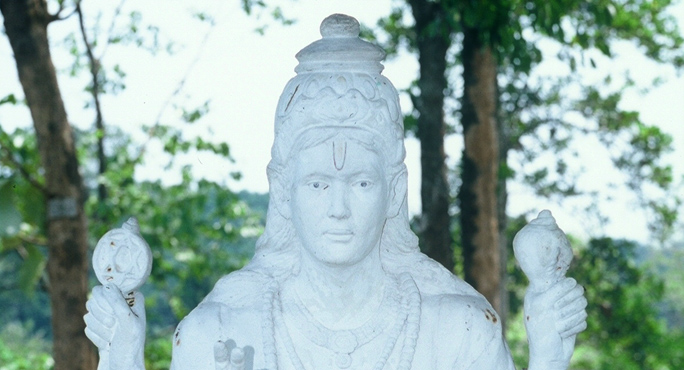
Dhanwantari, the patron god of Ayurveda. Photo by: Chris Kilham © 2006
The Indian subcontinent offers a spectacular wealth of health-enhancing plants, and my job is to find them. Last year while medicine hunting in the land of Ayurveda, India’s traditional system of medicine, I came upon Jeevani, which means "source of life"; I was traveling with an Indian scholar named Ramakrishna when we made our way to the little town of Palode, almost at the very southernmost tip of India. There we visited a spectacular botanical garden established for the preservation and investigation of the the flora of south India.
The Tropical Botanic Garden & Research Institute (TBGRI) in Palode is home to a world-class collection of tropical medicinal plants, and is a hub of intensive research into the specific uses and benefits of many south Indian plant species. I had first heard about TBGRI through a much publicized project conducted by Dr. Rajasekharan, head of the institute’s ethnomedicine division. The project resulted in the marketing of a formula called Jeevani. This formula was the very first plant medicine in India in which a percentage of sales went to natives from whose tradition the central herbal ingredient originated. In an area surrounded by lush green hills, singing birds and fragrant flower blossoms, TBGRI sat like a lustrous jewel in the crown of that region.
Dr. Rajasekharan greeted us with enthusiasm, and offered us a much welcome cup of tea. As we sat together he shared the story of his collaboration with the Kani people, a hill tribe whose medicinal plant knowledge led to the development of Jeevani. “Two of us from the Tropical Botanical Gardens were hiking in the Agastya Hills with a couple of members of the Kani tribe back in 1987. The conditions were quite difficult, with steep climbing. We were finding it very difficult to keep going, but the tribes people did not seem even the slightest bit fatigued. We asked them how they kept their energy going, and they showed us some small green berries which they said gave them energy. We had seen our guides chewing these along the way. I chewed a small handful, and right then I felt a sudden flush of energy and strength.”
Dr. Rajasekharan knew at once that the effect imparted by the small green berries was unusual, and that the plant had significant sales potential if it proved to be safe. The berries came from Tricopous zeylanicus, a plant the Kani call Aarogyappacha. Plant researchers at The Tropical Botanical Garden & Research Institute investigated the plant, which, as far as they could determine, grows only in the hills of Kerala province. Working closely with a company called Arya Veda Pharmacy, the researchers devised a tonic formula called Jeevani – which means source of life.
“It took us eight years to research and develop a product that we knew was safe and effective for promoting energy and relieving fatigue,” explained Dr. Rajasekharan. Jeevani contains ashwaganda (Withania somnifera), black pepper, a couple of other herbs, and Tricopus zeylanicus, the green, energy-imbuing berry of the Kani tribe. The product comes in granules. You take a half-teaspoon of this and mix it in hot water or hot milk and drink it down.
In accordance with the United Nations Convention on Biological Diversity, TBGRI decided to share profits from the Jeevani product with the Kani tribespeople. “We knew that we were doing the right thing,” says TBGRI’s director, Dr. P. Pushpangadan. Doing the right thing so flew in the face of common practice that the project made international news. In most cases, native people around the world are completely exploited for their medicinal plant knowledge, typically receiving little or nothing in return. For the Kani, pay day has already come, if modestly. The Kani received their first payment of $12,500, with further proceeds to follow on an annual basis.
Dr. Rajasekharan believes that the Jeevani project is a model for bringing healthful plants to the world market. “Our purpose here is to make sure that these valuable plants remain available, and that science into their medicinal uses continues,” Dr. Rajasekharan explained. “We are dedicated to this work. We hope to initiate more work like the Jeevani project, in time developing other medicines. There are so many valuable plants that can help people with common health problems.”
On the grounds of TBGRI, a beautiful black statue of Dhanwantari, the patron god of Ayurveda, stands on a hilltop overlooking the medicinal plant gardens. As we strolled the beautiful gardens and took pictures, I got the sense that TBGRI enjoyed some sort of special protection, and that the center would continue to be a fountain of good botanical works.

